
Solar panels have become a popular choice for individuals and businesses alike, seeking to harness the power of the sun to generate clean and renewable energy. As a potential buyer of solar energy-related products, it's essential to understand the impact of cleanliness on the performance and longevity of solar panels. In this article, we will explore whether cleaning solar panels makes a difference, what happens when they are dirty, the effects of water on solar panels, and the best methods for cleaning them effectively.
Do Solar Panels Work Better if They are Clean?
Solar panels are designed to convert sunlight into usable electricity, and their efficiency is directly affected by various factors, including cleanliness. When solar panels are clean and free from dirt, dust, and other debris, they can capture and convert sunlight more efficiently, resulting in increased electricity production. On the other hand, dirty solar panels can experience reduced performance due to decreased light absorption, leading to lower energy output.
What Happens When a Solar Panel is Dirty?
When solar panels accumulate dirt, dust, leaves, bird droppings, or other debris over time, it can hinder their ability to absorb sunlight effectively. The accumulated grime acts as a barrier, preventing light from reaching the photovoltaic cells within the solar panel. As a result, the panels generate less electricity, reducing their overall efficiency. Over an extended period, this decreased performance can impact the return on investment for solar panel owners.
Can Water Destroy Solar Panels?
One common concern when it comes to cleaning solar panels is whether water can cause damage. Generally, water alone does not pose a significant risk to solar panels. Modern solar panels are designed to be weather-resistant and can withstand exposure to rain and other natural elements. However, caution should be exercised when cleaning panels with hard water or using high-pressure water jets, as these can leave mineral deposits or potentially damage delicate parts of the panels.
Is Rain Enough to Clean Solar Panels?
While rainwater can help rinse off some superficial dust and dirt from solar panels, it may not be sufficient to keep them completely clean and operating at peak performance. Rainwater often contains minerals, and as it evaporates, it can leave behind residue on the surface of the solar panels. Additionally, certain regions with infrequent rainfall or high levels of air pollution may require more frequent cleaning to ensure optimal efficiency.
Is it Ok to Hose Off Solar Panels?
Hosing off solar panels is a common method used for cleaning, but it should be done with caution. Using a hose can be effective in removing larger debris, such as leaves or bird droppings, from the surface of the panels. However, it's important to avoid using high-pressure water jets, as they can potentially damage the panels or their delicate components. Instead, a gentle stream of water or a low-pressure spray nozzle can be used to rinse off the panels without risking harm.
Best Practices for Cleaning Solar Panels
1. Schedule regular cleaning: Regular cleaning helps maintain optimal performance. Depending on your location and environmental factors, cleaning once or twice a year is often sufficient, but more frequent cleaning may be necessary in areas with heavy pollution or high dust levels.
2. Choose the right time: Clean solar panels when they are cool, preferably in the morning or evening, to avoid rapid evaporation of cleaning agents and minimize the risk of thermal shock.
3. Use a soft brush or sponge: When manual cleaning is required, use a soft brush or sponge along with a mild soap or solar panel cleaning solution. Avoid using abrasive materials or harsh chemicals that could damage the panel's surface.
4. Hire professional cleaners: If you are unsure about cleaning the solar panels yourself or if they are installed in hard-to-reach areas, consider hiring professional solar panel cleaning services. They have the expertise, equipment, and knowledge to clean your panels safely and effectively.
Conclusion
Keeping solar panels clean is crucial for maximizing their performance and energy output. While rain can help to some extent, it may not be enough to remove all dirt and debris. Regular cleaning using appropriate methods and tools is recommended to ensure optimal efficiency and extend the lifespan of your solar panels. By maintaining cleanliness, you can reap the full benefits of solar energy and contribute to a greener and more sustainable future.
Remember, a well-maintained solar panel system not only generates more electricity but also provides a better return on investment, making it a sound and environmentally-friendly choice for powering your home or business.


0 Kommentare